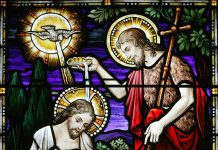
by Marian O’Brien, MTh
Background
* The Church uses this reading (Matthew 6:1-6, 16-18) as the Gospel every year on Ash Wednesday because it helps us set the tone for Lent—a time for repentance and conversion. Almsgiving, praying, and fasting are disciplines we employ to help us in the process of our conversion but, as Jesus teaches, our motivation is critical for the success of the process.
* Throughout his Gospel, Matthew presents Jesus as the turning point in salvation history. Jesus is the one Israel has been waiting for. He not only offers salvation through his death and Resurrection but also makes God’s kingdom present on earth. That kingdom is perpetuated in our time by the actions of Jesus’ faithful disciples. What does this Gospel tell us about how a disciple is to act?
* In his teaching, Jesus says, “Do not think I have come to abolish the law or the prophets. I have come not to abolish but to fulfill” (Matthew 5:17). Even so, the slant the people receive from some of the religious leaders of their day, including the example they set, is not what God intends and often leads people astray. The false values that the world teaches must give way to the message that Jesus brings.
* Ash Wednesday’s Gospel is part of Jesus’ Sermon on the Mount, when the teaching on the Beatitudes takes place. It is a particular instruction concerning the meaning of the Beatitude “Blessed are the poor in spirit, for theirs is the kingdom of heaven” (Matthew 5:3). It fleshes out the meaning of “poor in spirit.” It is not about physical poverty; rather, it’s about humility. A posture of humility sets the tone for the disciplines of almsgiving, praying, and fasting.
* This Gospel reading speaks of a love and inner conversion that is not characterized by external signs of piety and posturing. The right motivations—sincerity and purity of heart—are key to true conversion. Our conversion, and the subsequent change it brings about in us, is what will manifest the kingdom to others. Unlike some of the Pharisees and the scribes of Jesus’ day, we are to provide a true example of discipleship to others.
Answers: 1. Reward 2. Do not blow a trumpet 3. Hypocrites 4. Both of these 5. They want others to think they are holy 6. Going without something we like, usually food 7. Take care to look like we are not fasting
—Guide and activity sheet by Marian O’Brien, MTh. Art by Ansgar Holmberg, CSJ.
MATERIALS
* Copies of the activity sheet [CLICK HERE]
* Bibles (The Search is based on the New American Bible.)
* Pencils or pens
PROCEDURE
1. Have a student read aloud the opening of the story about Julie and Sam. Then ask the students these questions: Why is Julie nervous about talking to her friend Sam? (Answer: She is not sure how Sam will react to her challenge, especially after he calls their classmate a “loser” for giving some of his allowance to the food bank.) Which Lenten discipline—almsgiving, praying, or fasting—is Julie talking about? (Answer: almsgiving—by giving of their time).
2. Tell students that in today’s Gospel, Jesus is trying to teach his disciples that it is wrong to give money to the poor, pray, or fast just so that you get lots of attention and praise from others. We should do these things because God asks us to. We pray because it helps us make our relationship with God stronger. We fast and give to the poor because doing so helps us forget ourselves and look to the needs of others. The more we do these things, the more we become like Jesus.
3. Have students close their Bibles and work individually or in pairs to answer the questions on the activity sheet. Then read the correct answers and let students see how many they got right.
4. Summarize the material from the Background above.
5. Explain to students that the disciplines of almsgiving, praying, and fasting that we practice during the 40 days of Lent are meant to “stick.” We are to use the Season of Lent to develop good practices for our entire lives.
6. Tell students that it is important for us to practice being better disciples ourselves and to let our behavior be examples of discipleship for others.
7. Sometimes people don’t understand and they make fun of us. Sometimes, even our close friends don’t understand. Alone, we might not have the kind of courage that is necessary to stand up to opposition, but with God’s help, we will always have the courage to do the right thing.
8. Have one student read aloud the closing to the story about Julie and Sam. It is important to stress that, at first, we might not enjoy the idea of making sacrifices, but we do it so that we can be obedient to what God wants of us and because it helps us become more like Jesus. After a while, the sacrifices we make won’t seem so much like sacrifices.
Copyright 2013, Bayard, Inc. All rights reserved. This article is protected by United States copyright and other intellectual property laws and may not be reproduced, rewritten, distributed, redisseminated, transmitted, displayed, published or broadcast, directly or indirectly, in any medium without the prior written permission of Bayard, Inc.



